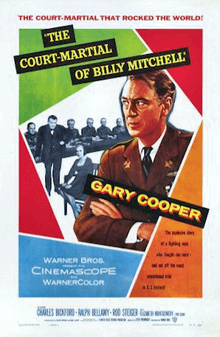The Court-Martial of Billy Mitchell
| The Court-Martial of Billy Mitchell | |
|---|---|
 1955 theatrical poster | |
| Directed by | Otto Preminger |
| Produced by | Milton Sperling |
| Written by |
Milton Sperling and Emmet Lavery Dalton Trumbo (uncredited) Michael Wilson (uncredited) Ben Hecht (uncredited) |
| Starring | Gary Cooper |
| Music by | composed and conducted by Dimitri Tiomkin |
| Cinematography | Sam Leavitt, A.S.C. |
| Edited by | Folmar Blangsted, A.C.E. |
Production company | |
| Distributed by | Warner Bros. Pictures |
Release dates |
|
Running time | 100 min. |
| Country | United States |
| Language | English |
| Box office | $3 million (US)[1] |

The Court-Martial of Billy Mitchell is a 1955 film directed by Otto Preminger. It stars Gary Cooper as Billy Mitchell, Charles Bickford, Ralph Bellamy, Rod Steiger and Elizabeth Montgomery in her film debut. It is based on the notorious court-martial of General Billy Mitchell, who is considered the founder of the U.S. Air Force. When it was released, Mitchell's sister Ruth, who served in World War II with Yugoslavian Chetnik guerrillas and later wrote a book about her brother, toured doing publicity for the film.[2]
Plot
Brigadier General William Mitchell tries to prove the worth of the Air Service as an independent service by sinking a battleship under restrictive conditions agreed to by Army and Navy. He disobeys their orders to limit the attack to bombs under 1,000 pounds and instead loads 2,000 pounders. With these, he proves his aircraft can sink the ex-German World War I battleship Ostfriesland, previously considered unsinkable. But his superiors are outraged.
Politically vocal, he is demoted to colonel and sent to a ground unit in Texas. A high-profile air disaster occurs in which his close friend Zachary Lansdowne is killed, the crash of the dirigible USS Shenandoah. This is followed by a second disaster in which six planes, poorly maintained because of lack of funds, flying from a base on the California coast to Fort Huachuca, Arizona, crash.
Mitchell at this point calls a press conference in which he makes harsh criticisms of the Army. He is then court-martialed.
It goes slowly for Mitchell's attorney and friend, Illinois Congressman Frank R. Reid, who tries everything, until he subpoenas President Calvin Coolidge. At this point the court decides to adjourn.
Clearly the military wants out of this limelight, but Mitchell refuses to sign a paper Reid has presented him in which he withdraws his criticisms in return for saving his career as an Army officer. Margaret Lansdowne, widow of Mitchell's dead friend from the Shenandoah, then appears in court. The previous barring of evidence demonstrating a justification for Mitchell's criticisms of his superiors failure to develop air power is repealed and many witnesses are then called forward to corroborate Mitchell's criticisms, including Eddie Rickenbacker, Carl Spaatz, Henry H. Arnold and Fiorello LaGuardia.
Finally Mitchell testifies and is cross-examined by a prosecutor specially brought in for the job (played by Rod Steiger) who stresses his having disobeyed his superior officers and who ridicules his attempts at foresight, even that accurately describing, in 1941, both Philippines and Hawaii were attacked by Japan.
The court finds Mitchell guilty, but he has presented his case to the public, which is somewhat of a win considering he wanted to raise awareness about the state of the Air Service. As his pilots salute him Mitchell steps out and looks up and sees a squadron of four biplanes in flight; the biplanes are replaced with a squadron of jets, demonstrating what Billy Mitchell's actions will result in for the future of the United States and its Air Force.
Cast
|
|
See also
References
- ↑ 'The Top Box-Office Hits of 1956', Variety Weekly, January 2, 1957
- ↑ "Ruth Mitchell, Sister of General, Dies at 80". Milwaukee Journal, Oct. 27, 1969, p. 11.
External links
- The Court-Martial of Billy Mitchell at the Internet Movie Database
- The Court-Martial of Billy Mitchell at AllMovie
- The Court-Martial of Billy Mitchell at the TCM Movie Database
- The Court-Martial of Billy Mitchell at History on Film